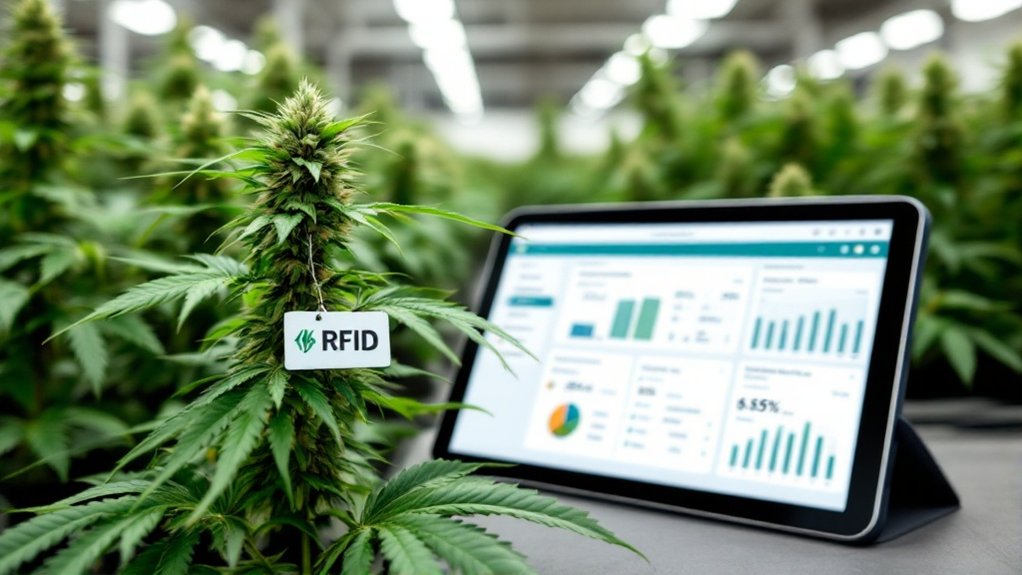Cannabis seed-to-sale software tracks every marijuana plant from cultivation to consumption. First introduced by MJ Freeway in 2010, these systems function like digital watchdogs, documenting each gram produced. They integrate with state platforms like METRC and BioTrackTHC, generating compliance reports while helping businesses identify inefficiencies. Staff need proper training to use these systems effectively. The technology doesn’t just satisfy regulators, it’s transforming the entire industry with data-driven insights that keep businesses both legal and profitable.
While the cannabis industry continues to bloom across the country, behind every legal gram of marijuana sits a complex tracking system few consumers ever see. This specialized software, aptly named “seed-to-sale” tracking (a term first coined by MJ Freeway back in 2010), functions as the industry’s digital watchdog, documenting every step of the plant’s journey from cultivation to consumption.
Let’s be real, cannabis might be the only legal product where companies track literally every gram produced. Every. Single. Gram. The software applies tags to plants in their infancy, often adding new ones during flowering, and package tags after harvest. It’s basically a plant passport system on steroids.
Think of it as TSA-level security for a plant, except every leaf gets its own boarding pass.
These systems integrate with state-mandated tracking platforms like METRC or BioTrackTHC. No shortcuts allowed. The software automatically generates compliance reports, reducing the risk of violations that could sink a cannabis business faster than you can say “Schedule I.” Metrc specifically employs RFID technology to provide regulators with complete visibility of the cannabis supply chain from seed to sale.
But it’s not all about appeasing regulators. The tracking creates serious business intelligence. Companies can identify inefficiencies, optimize processes, and maintain consistent quality. Want to know why that last batch of Blue Dream sold out while the Sour Diesel sits on shelves? The data knows.
Implementation requires careful consideration. Cannabis businesses must evaluate software capabilities, integration with existing systems, and staff training requirements. Not all systems are created equal. Some offer mobile accessibility for managing operations on the go because sometimes you need to check your inventory while standing in a grow room. Modern seed-to-sale solutions provide intuitive software interfaces that significantly reduce the learning curve for new employees. Successful implementation should involve all relevant stakeholders to ensure smooth adoption across the organization.
The impact on the industry has been transformative. These systems provide the transparency backbone that allows legal cannabis markets to function. They simplify inventory management, boost cultivation yields through better tracking, and maintain the precise reporting regulatory bodies demand.
For an industry emerging from prohibition’s shadow, seed-to-sale software delivers exactly what cannabis needs most: accountability, transparency, and the data to prove it.
Frequently Asked Questions
How Much Does Cannabis Seed-To-Sale Software Typically Cost?
Cannabis seed-to-sale software isn’t cheap.
Most operations shell out between $500 to $2,000+ monthly, depending on scale. Small shops start around $500, while mid-market businesses typically pay $1,000-$1,500.
Got multiple locations? Expect to fork over $2,000+. Prices vary based on facility size, state requirements, and user count.
Some vendors offer stripped-down free versions. Want fancy analytics or customization? That’ll cost extra.
Can Seed-To-Sale Software Integrate With My Existing POS System?
Yes, most seed-to-sale software integrates with existing POS systems. Cloud-based APIs make the connection possible. Companies like Flowhub, BioTrack, and Distru offer ready-made connectors for popular platforms.
Some legacy systems, though? Not so lucky. Integration eliminates redundant data entry and automates compliance reporting. Real-time inventory updates prevent embarrassing overselling scenarios.
Be prepared, compatibility varies, and you might face additional fees for custom development work or middleware solutions.
How Long Does Implementation and Staff Training Usually Take?
Implementation and staff training for seed-to-sale software typically takes 4-12 weeks.
Larger operations need more time. Initial staff training runs 1-2 weeks, covering those critical compliance workflows.
Some states force the timeline with hard deadlines. Illinois businesses had just 10 weeks to get their act together with Metrc.
Regulatory deadlines wait for no one.
What Happens if There’s a System Outage During Reporting Deadlines?
System outages during reporting deadlines? Pure chaos.
Businesses face a regulatory nightmare with fixed state deadlines showing no mercy. Staff scramble to track everything manually, a recipe for expensive mistakes. Costs pile up fast. Extra labor, back-entry headaches, inventory mismatches.
Some states offer limited guidance, most expect perfect compliance anyway. Regulators don’t care if it’s not your fault.
The industry’s response? Paper backups and prayers that systems recover quickly.
Are There Seed-To-Sale Solutions for Hemp-Only Businesses?
Hemp businesses have their own specialized seed-to-sale tracking options.
Companies like BioTrack, Distru, Canix, Flourish, and MJ Platform offer hemp-specific solutions that cost less than cannabis versions. They’re built differently, focusing on that essential 0.3% THC threshold and agricultural management rather than dispensary features.
These systems handle COA management, USDA reporting, and bulk biomass tracking. Interstate shipping? They’ve got that covered too.










